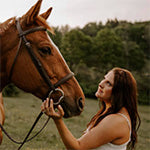It seems some people swear by using hay nets while other horse owners have negative opinions about how hay nets might affect horse health and safety.
While there are certainly precautions that should be taken when choosing a hay net size and where it is hung, hay nets can also have a number of benefits for both hard-keeping and easy-keeping horses.
In this article, you’ll discover the benefits of using hay nets, considerations when choosing and hanging hay nets, precautions that should be taken, and recent research regarding how hay net use affects horses’ health.
The Pros of Hay Nets
Hay nets can be a great tool overall for many horses. This is because hay nets essentially slow down the hay eating process. Slowing down how quickly a horse consumes its hay is an advantage when there is a necessity to limit hay, or when offering free-choice hay.
The way hay nets offer a slower-feed method aligns with the way their digestive system works and can be beneficial for horses prone to digestive issues. The horse’s digestive system was designed for continuous grazing, and as a result, the horse’s stomach secretes acid continuously. Slowing down hay intake more closely mimics natural grazing behavior and prevents the horse from having an empty stomach for long periods of time. Spending long periods of time without forage increases the risk of ulcers.
Hay nets can also reduce wasted hay when compared to being placed on the ground. This is because the hay is not being walked on, or possibly urinated and defecated on, which then makes it unpalatable to the horse.
In addition, hay nets can help prevent stall boredom and improve mental stimulation as it takes time and effort for them to pull smaller portions of hay from the hay net.
Choosing the Right Hay Net for Your Horse
Traditionally, hay nets were designed with larger openings that did not restrict a horse’s hay intake rate.
Today, however, there are a wider range of hay net openings that can be as small as 1.25”. This can further reduce hay waste and slow down the horses’ rate of hay intake.
Depending on if your horse is a hard-keeper or easy-keeper, the size of the hay net’s opening can help you have better control over hay consumption and the rate it’s consumed.
For example, hay nets give you a great advantage when there is a necessity for limiting hay intake for easy keepers. Hay nets with very small openings are what would be best for the fast-eating horses or feeding limited amounts of hay to easy-keepers.
For harder-keeping and picky eaters, many will prefer hay out of a net than they will off the ground. Choosing a hay net with a moderate-sized hole would likely be ideal for this kind of horse.
Precautions When Using Hay Nets
Large, slow feeders for pasture use have also been made of varying materials. However, horse owners quickly learned that while metal grates slowed down how quickly a horse ate, there were also reports of excessive wear on the front teeth due to these types of materials.
Netted hay nets designed for whole square bales or to put over a round bale are now available instead, which avoids the problem of excess wear on a horse’s teeth. Keep in mind the placement of these larger hay nets so that shod horses don’t have the opportunity to catch a shoe on the netting.
When hung in a stall, hay nets, slow or regular, need to be hung at a height where horses can’t catch a shoe or leg in them when they’re rolling. It’s also important to think about how far the hay net hangs down when the hay net will be both full and empty.
Another negative opinion surrounding hay nets is that the horse isn’t eating in a natural grazing position. This concern does have merit, particularly for horses with cervical arthritis or issues with their poll or back.
If hay nets are too elevated above the horse’s head, this can also cause the nasal passages to not drain properly, which poses an increased risk of respiratory infections.
Some slow feeders are designed to allow a more natural grazing position. They can be considerably more expensive or may require some DIY skill when hanging them.
Recent Research Findings: The Way Hay Nets Affect Horses’ Dental Health and Body Condition
Historically, horse owners may have been hesitant to use hay bags because they were concerned even netted nets could affect dental health or their body condition score versus feeding hay on the ground.
A recent study was conducted which researched how hay nets affect a horse’s overall health.
In this study, thirteen horses were randomly assigned either a hay net or ground-fed hay method and then studied for a year. After a year, the horses were switched to the hay feeding option opposite to what they had done the first year. The second phase of the study also lasted one year.
During the two years this study was conducted, researchers took pictures and noted any changes in the horses’ teeth and body score condition changes.
The good news is that the study found feeding horses with hay nets did not impact incisor length or cause bevels on the incisors. While horse owners have worried hay nets were too abrasive on a horse’s teeth, the horses in this year-long study showed the same number of dental abnormalities regardless of whether they ate from a hay net or not. This concluded hay nets didn’t negatively affect dental heath in accordance with the study.
Feeding with hay nets gave them more control over managing a horse’s body weight, and in turn, body condition scores per this study. The horses eating hay from hay nets in this study also kept within healthier body condition scores overall.
The study also confirmed that hay nets can be an extremely valuable way to reduce hay waste, which can save horse owners money in the long-term. The study showed hay waste was reduced by 20% when hay nets were used.
As long as they are safely installed at the proper height and with an opening that is best for the individual horse’s needs, hay nets offer a more prolonged way of feeding horses. This can positively affect horse health overall by decreasing boredom when stalled and provide a more customized rate of feeding that can better align with a horse’s natural digestive system.
References
DeBoer, M., L. Keener, J. Layeux-Parks, O. Schueller, L. Johnson, and K. Martinson. 2024. Effect of hay nets on horse bodyweight, body condition score, hay usage, and dental health in mature adult horses. Equine Science Society Symposium 2023. Available online 24 March 2024. https://doi.org/10.1016/j.jevs.2024.103987.


